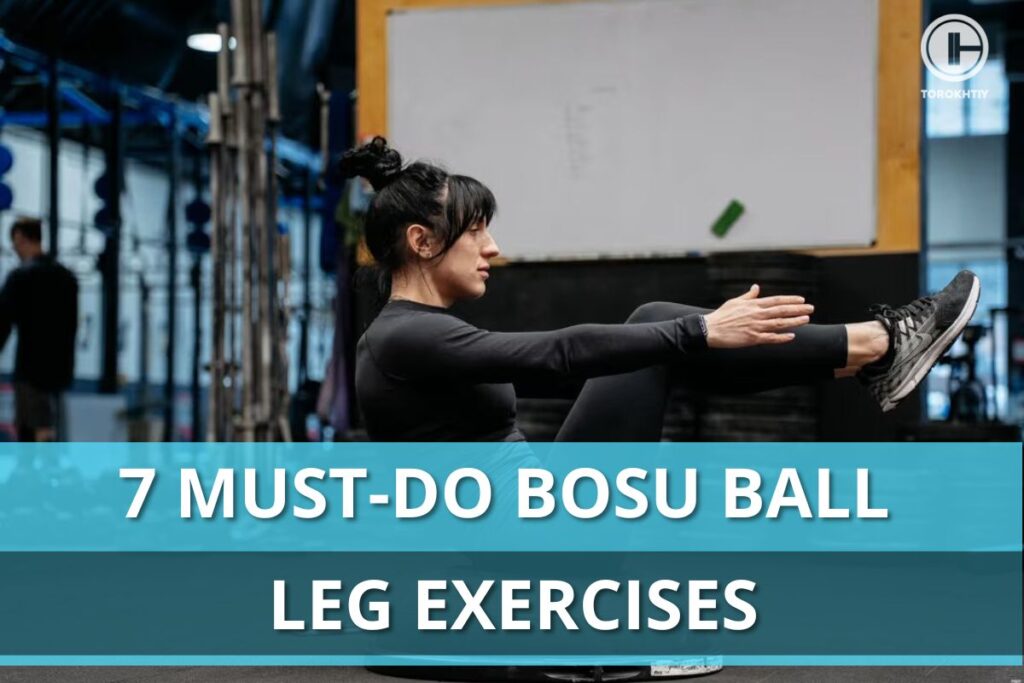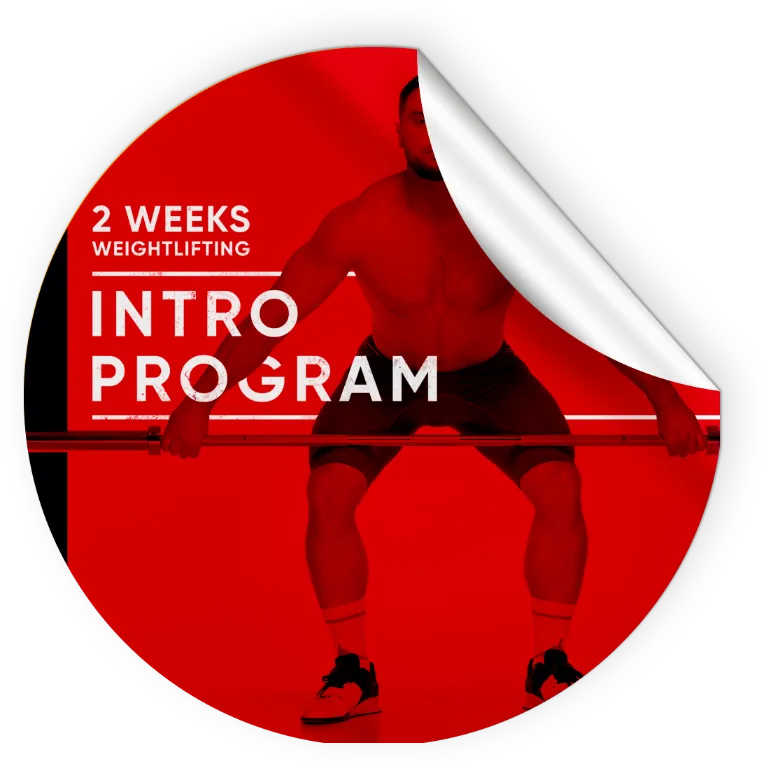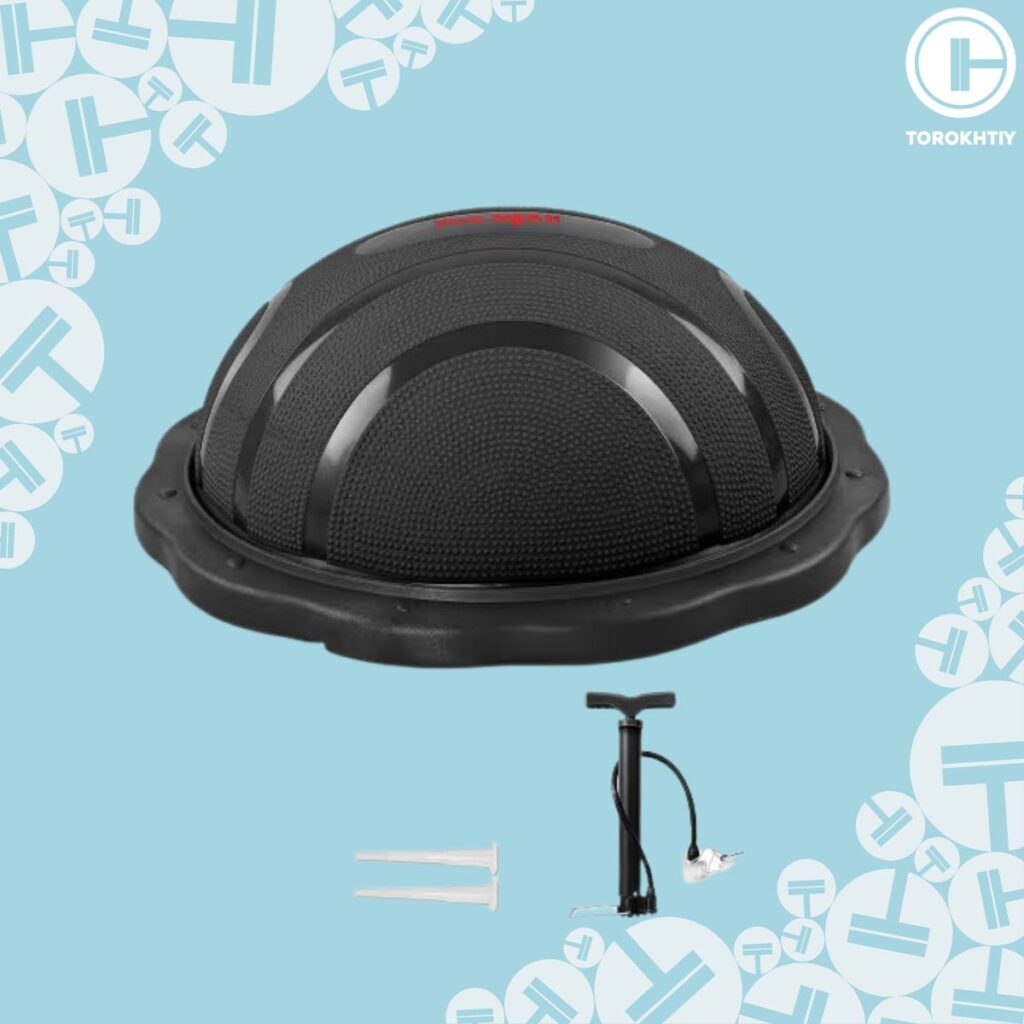7 Must-Do Bosu Ball Leg Exercises
Author:
Unlock your full potential by engaging with our experts and community! Have questions about your fitness journey or looking for expert advice on weightlifting techniques? Don’t hesitate — leave a comment below and Tanya Shaiko will provide a personalized answer and insights to help you reach your goals.
Torokhtiy is reader-supported. Some links are affiliate links, and we may earn a commission at no extra cost to you. See our disclosure page for details.
Bosu ball leg exercises aren’t as popular as the usual squats and lunges, but they’re highly effective in helping you build power and strength in the lower body.
But those aren’t the only benefits you can get from training with a bosu ball – it’s an ideal way to mix up your workouts, and it helps you work on your balance and stability, as leg exercises with bosu ball require you to not only be strong but also to be able to retain your balance, even when performing movements on an uneven surface (such as a ball).
Having said that, as we know that a lot of people aren’t aware of the different bosu ball lower body exercises that exist, we decide to compile the very best ones in this short article. And so, without keeping you waiting any longer, let’s take a look at the movements you can use to build your very own effective bosu ball leg workout.
What Are the Benefits of Bosu Ball Leg Exercises? Not only do they help you build strength and explosiveness in the lower body, but they also work your core and challenge your balancing skills. Such exercises are very versatile and challenging.

Bosu Ball Leg Exercises
There is no shortage of bosu ball exercises for legs – in fact, there are so many that it can be hard to choose which ones to include in your workout sessions and which ones to leave out.
In the paragraphs below, we will introduce you to the very best bosu ball leg exercises and divide them into three sections – for beginners, intermediate lifters, and advanced athletes. Hopefully, that will make it even easier for you to choose which ones to do and which ones to leave for the future.
Follow us!

Free!
Get a 2-week Weightlifting Program as a bonus for the subscription to kickstart your training plan!

Free!
1. For Beginners
• Glute Bridge On Bosu Ball
The glute bridge on the bosu ball is one of the best exercises for beginners. It not only targets the glutes and hamstrings, but it does so without requiring the person to keep balance, which makes it a lot easier to do. To do it, you have to:
- Place the bosu ball flat-side down.
- Lay on your back, bend your knees, and place your feet on the bosu ball.
- Then lift your bottom off the ground until the hips are fully extended, squeezing your glutes at the top.
- Then lower your hips back down to the floor.
• Forward Lunge
This exercise challenges your balance and stability. Along with that, forward lunges are one of the best lower-body exercises and are an absolute must-do for every athlete that wants to gain leg strength. To perform it, you need to:
- Place the bosu ball flat side down on the floor.
- Stand one step behind the bosu ball,
- Then, while raising your chest, make a forward lunge until you step on the bosu ball, with your foot landing in the middle.
- Keep your balance and then stand up and step back to the start.
- Repeat with the other leg.
• Side-To-Side Squat
This is a beginner exercise that can help you gain strength and stability so that you’re able to do the full-on squat later on. Additionally, it enables you explicitly to work on your abductors while also helping you improve your hip mobility. To perform you:
- Place the bosu ball down on the floor with the flat side facing down.
- Stand on one side of the bosu ball and step your foot onto the middle of the ball while maintaining your direction.
- Then squat down, switch feet, and squat to the opposite side of the ball as you go up.
- Repeat.
2. For Intermediate Lifters
• Squat
The squat is an essential leg exercise that targets all the muscles in your lower body. What makes it hard on the bosu ball is the fact that you need to maintain your balance while also squatting down. And if you add additional weight with dumbbells or with a barbell, it becomes even more difficult. To do it, you have to:
- Place the bosu ball flat side down on the floor.
- Then step on the ball, keeping your heels in the middle and your toes pointing out.
- Squat down, hold at the bottom, then lift yourself up.
- Repeat.
• Single-Leg Bridge
With the single-leg bridge variation, you’re emphasizing your glutes and hamstrings more. Doing the glute bridge with only one leg makes it a lot more difficult and also enables you to work on any asymmetries that you may have. To do it, you should:
- Place the bosu ball on the ground with the flat side facing down.
- Lay down on the floor, bend your knees, and place one foot in the middle of the ball.
- From there, lift your leg that left off the floor until you feel a squeeze in your glute.
- Then lower down and repeat with the other leg.
3. For Advanced Lifters
• Single-leg Squat
Performing a single-leg squat on the bosu ball requires not only strength but also great mobility and balance. It’s one of the most challenging exercises you can do, and it’s definitely suited to more advanced athletes.
With that said, it’s also one of the best exercises you can do as an athlete, as it can work on any imbalances you may have in your lower body. To do it, you need to:
- Place the bosu ball on the floor with the ball side facing down.
- Then step into the middle with one foot and squat down with your opposite arm facing forward.
- Once you’re down, hold for a second and then raise yourself back up.
- Repeat with the opposite leg.
• Single-leg Deadlift
The single-leg deadlift is an incredible exercise for the very same reasons as the single-leg squat. Again, it challenges not only the muscles in your glutes and hamstring but also your ability to maintain balance during a complex movement. Performing it goes like this:
- Place the bosu ball on the ground, ball side facing down.
- Then step into the middle of the ball with one foot and stand up straight.
- From there, bend to touch the ground while keeping your back and leg straight.
- Once you lower yourself to the ground, slowly bring yourself back to standing.
- Repeat with the opposite leg.
Bosu Ball We Recommend: Yes4All Bosu Ball
A lot of commercial gyms don’t have bosu balls available, and if you want to use one, you might have to buy it for yourself. As there are many options on the market, we would recommend one from Yes4All.
You can choose from several color options, it comes with a pump so that you can use it right away, and along with that, it’s made from high-quality PVC material that can support up to 880 pounds.
Additionally, it has a non-slip textured design so that you can work out even when you’re super sweaty. It weighs just around 16 pounds, so it’s easy to carry around if you need to.
FAQ
Is the Bosu Ball Good for Legs?
The bosu ball is great for building leg strength while also working on improving your stability and balance. The bosu ball is incredibly effective for your lower body muscles as long as you do the right exercises.
Are Bosu Ball Squats Effective?
Squats are perhaps the best lower body exercise for building strength, and doing them on a bosu ball doesn’t make them any less effective. So yes, if you’re looking to work on your leg muscles, squats on a bosu ball are a terrific option.
Should You Wear Shoes on a Bosu Ball?
There’s no rule. You can use the bosu ball with bare feet, socks, or trainers. The main difference is that you won’t feel as stable with socks, as there’s a higher chance of slipping. And so, barefoot or trainers are a better option, especially if you’re performing more complex exercises.
In Conclusion
The bosu ball is a great piece of equipment that could be utilized for building strength in the lower body. Along with that, it’s highly effective for athletes who want to work on strength and explosiveness and would also like to get better stability and balance.
The main benefit of the bosu ball is that it allows you to work on a shaky surface, thus challenging your muscles in a different way and helping you boost your athletic performance. With that said, the exercises we discussed are just a few that you can do, and if any of you have favorite bosu ball movements, please share them with us in the comments.
Also read:
- Bosu Ball Ab Workout
- Benefits Of Bosu Ball
- Medicine Ball Exercises
- Bosu Ball Squats
- Best Weight Training Belt
- Beginner’s Guide To Cable Machines
References:
- Effects of Strength Training Using Unstable Surfaces on Strength, Power and Balance Performance Across the Lifespan // Ncbi: https://www.ncbi.nlm.nih.gov/pmc/articles/PMC4656700/
- Comparative Effects of Different Balance-Training–Progression Styles on Postural Control and Ankle Force Production: A Randomized Controlled Trial // Ncbi: https://www.ncbi.nlm.nih.gov/pmc/articles/PMC4852315/
- 20 GLUTE BRIDGE VARIATIONS TO STRETCH YOUR HIPS AND ACTIVATE YOUR GLUTES // Redefiningstrength: https://redefiningstrength.com/20-glute-bridge-variations-stretch-hips-activate-glutes/
- 10 Beginner BOSU Balance Trainer Exercises // Verywellfit: https://www.verywellfit.com/beginner-bosu-balance-trainer-exercises-1231446
- 10 Beginner BOSU Balance Trainer Exercises // Beachbodyondemand: https://www.beachbodyondemand.com/blog/lower-body-workout-exercises
- All photos are made by our Torokhtiy Media Team
Why Trust Us?
With over 20 years in Olympic weightlifting, strength training, nutrition coaching, and general fitness our team does its best to provide the audience with ultimate support and meet the needs and requirements of advanced athletes and professional lifters, as well as people who strive to open new opportunities and develop their physical capabilities with us.
By trusting the recommendations of our certified experts in coaching, nutrition, and sports training programming, as well as scientific consultants, and physiotherapists, we provide you with thorough, well-considered, and scientifically proven content. All the information given in the articles concerning workout programming, separate exercises, and athletic performance, in general, is based on verified data.
The product testing process is described in more detail here.
Author: Tanya Shaiko
News Editor, Olympic Lifting Enthusiast
Best Results: Snatch – 61 kg,
C&J – 78 kg
I’m Tanya, and I just can’t do without fitness. About six years ago, I got into Olympic weightlifting and instantly fell in love with it. Weightlifting is like no other sport – it’s just you versus the bar. Driven by my unwavering passion for an active lifestyle, I’ve been eager to share my personal journey and sports enthusiasm with others. As a journalist and photographer, my interests come full circle, adding an extra dimension to the news column that I curate. This way, I keep my readers updated with the latest happenings in the sports world.




Still have questions after reading our article? Unlock your full potential by engaging with our experts and community! Don’t hesitate — leave a comment below and Tanya Shaiko will provide a personalized answer and insights to help you reach your goals.